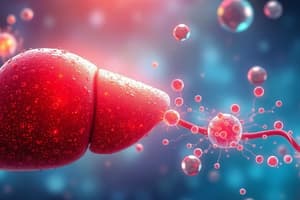Podcast
Questions and Answers
Which organ is primarily responsible for drug metabolism in the body?
Which organ is primarily responsible for drug metabolism in the body?
- Intestines
- Lungs
- Liver (correct)
- Kidneys
What is the first phase of drug metabolism called?
What is the first phase of drug metabolism called?
- Phase 2
- Enzymatic conversion phase
- Phase 1 (correct)
- Cytochrome P450 phase
Which enzyme family is responsible for metabolizing more than 60% of drugs on the market?
Which enzyme family is responsible for metabolizing more than 60% of drugs on the market?
- CYP1A2
- CYP2D6
- CYP450 (correct)
- CYP3A4
What is a major consequence of liver failure on drug metabolism?
What is a major consequence of liver failure on drug metabolism?
What is the primary site for drug metabolism other than the liver?
What is the primary site for drug metabolism other than the liver?
What is the definition of liver clearance in pharmacokinetics?
What is the definition of liver clearance in pharmacokinetics?
How does a change in blood flow to the liver affect drug clearance?
How does a change in blood flow to the liver affect drug clearance?
How does a decrease in protein binding affect the pharmacokinetics of drugs with low extraction?
How does a decrease in protein binding affect the pharmacokinetics of drugs with low extraction?
What is the impact of hepatic failure on drug handling?
What is the impact of hepatic failure on drug handling?
What is the purpose of using the Child-Pugh scoring system in relation to drug recommendations?
What is the purpose of using the Child-Pugh scoring system in relation to drug recommendations?
Which of the following is NOT a phase of drug metabolism?
Which of the following is NOT a phase of drug metabolism?
Which enzyme family is responsible for metabolizing the majority of drugs in the body?
Which enzyme family is responsible for metabolizing the majority of drugs in the body?
What is the primary function of phase II drug metabolism?
What is the primary function of phase II drug metabolism?
Which organ plays a significant role in the first-pass metabolism of orally administered drugs?
Which organ plays a significant role in the first-pass metabolism of orally administered drugs?
What effect does genetic polymorphism in drug-metabolizing enzymes have on drug metabolism?
What effect does genetic polymorphism in drug-metabolizing enzymes have on drug metabolism?
What is the primary site of drug metabolism in the body?
What is the primary site of drug metabolism in the body?
Which enzyme family is responsible for metabolizing the majority of drugs on the market?
Which enzyme family is responsible for metabolizing the majority of drugs on the market?
What is the purpose of the Child-Pugh scoring system in relation to drug recommendations?
What is the purpose of the Child-Pugh scoring system in relation to drug recommendations?
How does hepatic failure impact drug handling?
How does hepatic failure impact drug handling?
What is the first phase of drug metabolism called?
What is the first phase of drug metabolism called?
Flashcards are hidden until you start studying
Study Notes
- Drug metabolism is a process that involves the enzymatic conversion of drugs into metabolites, typically in the liver and intestines.
- The liver is one of the primary sites of drug metabolism.
- Drug metabolism is split into two phases: Phase 1 and Phase 2.
- Phase 1 metabolism is mediated by enzymes, particularly from the Cytochrome P450 (CYP) family.
- CYP enzymes metabolize over 60% of drugs on the market.
- Liver impairment, such as liver failure, can affect drug metabolism.
- Clearance is a term used in pharmacokinetics to describe the removal of drug from the liver.
- High clearance drugs, such as Alprenolol and Propranolol, are affected less by changes in blood flow.
- Low clearance drugs, such as Warfarin and Diazepam, are sensitive to changes in blood flow and plasma protein binding.
- Hepatic failure is a condition that can affect the handling of drugs by the liver, leading to changes in metabolism, distribution, and plasma concentrations.
- The Child-Pugh scoring system is used to make recommendations for individual drugs in the context of hepatic failure.
- The liver plays a crucial role in drug metabolism, and liver impairment can significantly affect drug clearance and pharmacokinetics.
Studying That Suits You
Use AI to generate personalized quizzes and flashcards to suit your learning preferences.



